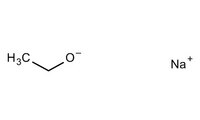820871 Sigma-Aldrich乙醇鈉
Sodium ethoxide for synthesis. CAS No. 141-52-6, EC Number 205-487-5.
More>> Sodium ethoxide for synthesis. CAS No. 141-52-6, EC Number 205-487-5. Less<<Synonyms: Sodium ethylate, Sodium ethanolate
Recommended Products
Overview
| Replacement Information |
|---|
Key Spec Table
| CAS # | EC Number | Hill Formula | Chemical Formula | Molar Mass |
|---|---|---|---|---|
| 141-52-6 | 205-487-5 | C₂H₅NaO | C₂H₅ONa | 68.05 g/mol |
Products
| Catalogue Number | Packaging | Qty/Pack | |
|---|---|---|---|
| 8.20871.0250 | 玻璃瓶 | 250 g | |
| 8.20871.1000 | 1 kg |
| Description | |
|---|---|
| Catalogue Number | 820871 |
| Synonyms | Sodium ethylate, Sodium ethanolate |
| References |
|---|
| Product Information | |
|---|---|
| CAS number | 141-52-6 |
| EC index number | 603-041-00-8 |
| EC number | 205-487-5 |
| Hill Formula | C₂H₅NaO |
| Chemical formula | C₂H₅ONa |
| Molar Mass | 68.05 g/mol |
| HS Code | 2905 19 00 |
| Structure formula Image | |
| Quality Level | MQ200 |
| Applications | |
|---|---|
| Application | Sodium ethoxide for synthesis. CAS No. 141-52-6, EC Number 205-487-5. |
| Biological Information |
|---|
| Physicochemical Information | |
|---|---|
| Density | 0.87 g/cm3 (20 °C) |
| Ignition temperature | 30 - 50 °C |
| pH value | 13 (5 g/l, H₂O, 20 °C) |
| Vapor pressure | <0.1 hPa (20 °C) |
| Bulk density | 300 kg/m3 |
| Dimensions |
|---|
| Materials Information |
|---|
| Toxicological Information | |
|---|---|
| LD 50 oral | LD50 Rat 598 mg/kg |
| Safety Information | |
|---|---|
| Categories of danger | highly flammable, corrosive |
| Product Usage Statements |
|---|
| Storage and Shipping Information | |
|---|---|
| Storage | Store at <= 20°C. |
| Packaging Information |
|---|
| Supplemental Information |
|---|
| Specifications | |
|---|---|
| Assay (acidimetric) | ≥ 95.0 % |
| Free NaOH | ≤ 2.0 % |
| Global Trade Item Number | |
|---|---|
| Catalogue Number | GTIN |
| 8.20871.0250 | 04022536468204 |
| 8.20871.1000 | 04022536468211 |
Documentation
乙醇鈉 MSDS
| Title |
|---|
乙醇鈉 Certificates of Analysis
| Product Number | Packaging | Specification | Lot Number |
|---|---|---|---|
| 8.20871.0250 | 玻璃瓶 | PDF Specification Document | |
| 8.20871.1000 | PDF Specification Document |

















